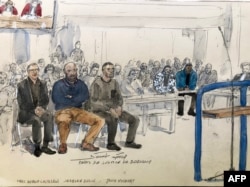A French court on Friday convicted three police officers of “voluntary violence” toward a youth worker in a Paris suburb who suffered serious injuries to his rectum after being assaulted with a police baton during an identity check seven years ago.
All three officers received suspended prison sentences. The officer who used the baton to strike Theo Luhaka was given a suspended sentence of 12 months, while the other two present on the scene got three months each.
Luhaka, a youth worker of African descent who was 22 years old at the time, filed a lawsuit accusing the officers of assaulting him during an identity check in February 2017 in Aulnay-sous-Bois, a working-class suburb northeast of Paris with a large immigrant population.
Rights defenders have long complained of French police abusing their powers during identity checks on people of color.
The court in the town of Bobigny, about 9 kilometers (5 miles) northeast of the French capital, dropped the charge of a “permanent infirmity” in its decision. A charge of rape was dropped earlier.
Despite the light sentences, the verdict brought a sense of closure for Luhaka, the French press reported his lawyers as saying.
“It’s a decision … that we take as a victory,” said Antoine Vey, Luhaka’s lawyer, according to the daily Le Monde. Luhaka did not speak but had said earlier that he would be relieved if the police were convicted.
The lawyer for Marc-Antoine Castelain, the officer who received the 12-month sentence, also welcomed the verdict.
“The first impression of our client is the immense relief that, for the first time, in the eyes of France, it has been established that … he is not a criminal,” Le Monde quoted Thibault de Montbrial as saying, adding that the court had set the record straight about his actions at the time.
Widespread anger erupted after a video surfaced online apparently showing Luhaka’s arrest on Feb. 2, 2017. The incident was followed by a week of protests in suburbs around Paris, many degenerating into violence.
Rioting has accompanied police ID checks gone awry in the past. Most recently, the shooting death of Nahel Merzouk, a 17-year-old youth with Algerian roots, during a police ID check last June touched off days of rioting around France. The motorcycle police officer who fired into the stopped car driven by the young man has been charged with voluntary homicide but was released from detention during the investigation.
In the case of Theo Luhaka, Le Monde reported that Castelain, the officer who used the “telescopic baton,” was also banned from carrying a weapon or patrolling the streets for five years. The other two officers received similar bans for two years.
All three denied wrongdoing and said their reaction was justified because the young man was in “rebellion.”

